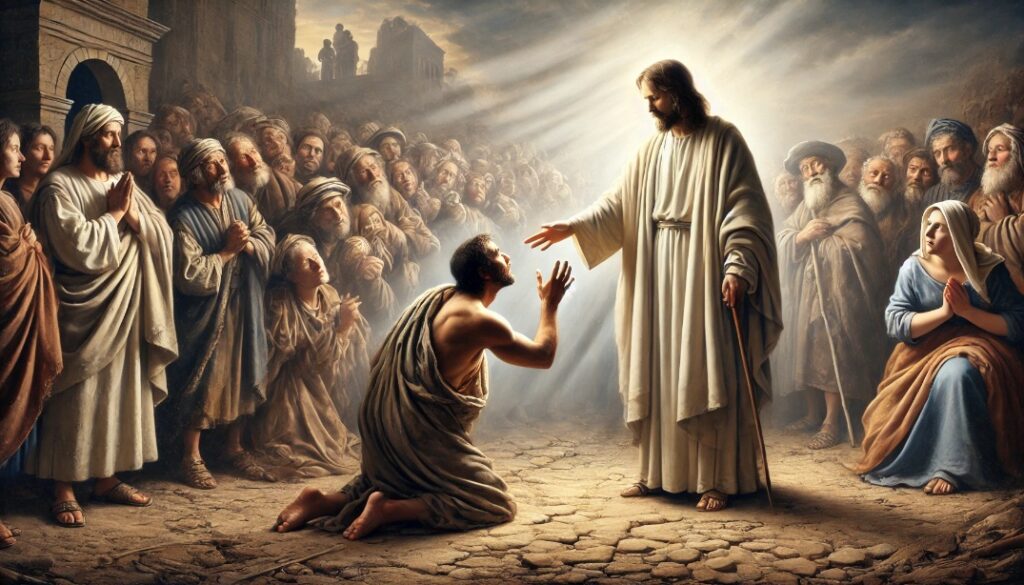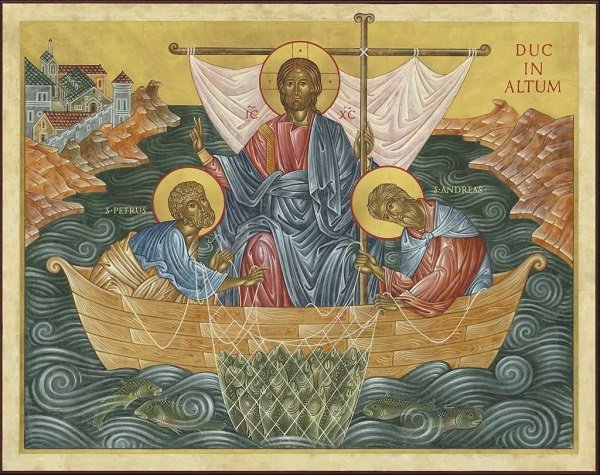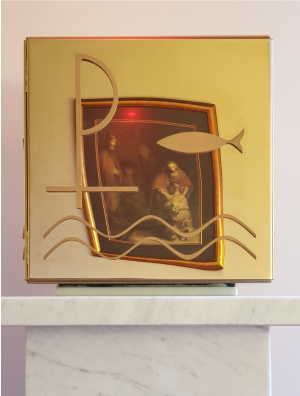Gospel of Luke
As Jesus approached Jericho
a blind man was sitting by the roadside begging,
and hearing a crowd going by, he inquired what was happening.
They told him,
“Jesus of Nazareth is passing by.”
He shouted, “Jesus, Son of David, have pity on me!”
The people walking in front rebuked him,
telling him to be silent,
but he kept calling out all the more,
“Son of David, have pity on me!”
Then Jesus stopped and ordered that he be brought to him;
and when he came near, Jesus asked him,
“What do you want me to do for you?”
He replied, “Lord, please let me see.”
Jesus told him, “Have sight; your faith has saved you.”
He immediately received his sight
and followed him, giving glory to God.
When they saw this, all the people gave praise to God.
The healing of the blind man on the road to Jericho is a profound encounter that speaks to the nature of faith, the recognition of our spiritual blindness, and the transformative power of God’s grace. The man’s persistent cry, “Son of David, have pity on me!” is an act of bold faith. Despite the rebukes and attempts to silence him, he refuses to be deterred. By addressing Jesus as the “Son of David,” he acknowledges Him as the Messiah, the fulfillment of God’s promises. This persistence, rooted in faith, cuts through the noise of the crowd and captures the attention of Christ. We are challenged to ask ourselves: Do we cry out to God with such unwavering determination, especially when the world seeks to silence or discourage us?
Jesus’ question to the blind man, “What do you want me to do for you?” is striking. Although He surely knows the man’s need, He invites him to articulate it, affirming his dignity and his freedom to ask. This moment reveals the personal nature of God’s love. He does not simply act upon us but desires a relationship where we approach Him in trust and honesty. The man’s reply, “Lord, please let me see,” is both a plea for physical healing and a reflection of his deep spiritual longing. It reminds us that our prayers must also stem from an authentic recognition of our need for God.
As many of the Church Fathers observed, this healing points to a deeper reality: through Christ, we are given the ability to see the world aright. The blind man’s story is not just about the restoration of physical sight but the illumination of spiritual truth. Spiritual blindness—the inability to see ourselves and the world in the light of God’s truth—can be an even greater affliction. As Bishop Barron reminds us, the most crucial step in our spiritual journey is the painful awakening to just how lost we are. Like Dante at the beginning of The Divine Comedy, we must first recognize that we have wandered from the straight path and stand in desperate need of grace. This realization is often uncomfortable, as it shatters the illusions of self-sufficiency and complacency, but it is the necessary first step toward salvation.
Upon receiving his sight, the man hears Jesus’ profound words: “Your faith has saved you.” It is significant that Jesus does not say, “Your faith has healed your blindness,” but rather, “saved you.” This declaration reveals the deeper miracle at work—not just the restoration of physical sight but the redemption of the man’s soul. Salvation, in this context, transcends the physical and enters the realm of eternal life and relationship with God. This is the ultimate gift of faith: it opens our eyes not just to see the world, but to see the truth of God’s love and our place in His divine plan.
The blind man’s faith, persistence, and response become a model for all discipleship. His journey from blindness to sight, from despair to salvation, calls us to recognize our own spiritual blindness, to cry out with unwavering faith, and to allow Christ’s grace to transform our lives entirely. Like the healed man, we are invited not only to follow Jesus but to glorify God with every step, inspiring others to do the same. His response teaches us that the blessings we receive are not meant to remain private but to draw others to God. The journey from blindness to sight, from need to gratitude, is the essence of discipleship. Like the blind man, we are called to recognize our need, cry out to Christ, and allow His grace to illuminate our lives so that we, too, may glorify God and lead others to His saving love.



